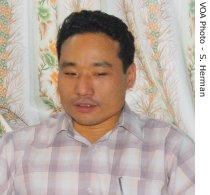-
(单词翻译:双击或拖选)
Kathmandu
23 April 2007
Nepal has suffered through 10 years of a violent communist insurgency1, and a coup2 by the reigning3 monarch4. Now, precisely5 one year after mass protests forced King Gyanendra to relinquish6 absolute power, the Himalayan kingdom is struggling to implement7 a form of democracy that could embrace both the former communist rebels and a monarchy8. VOA Correspondent Steve Herman was in Kathmandu and brings us more on the story.
| Opposition party supporters demonstrate against King Gyanendra in Kathmandu, 19 Apr 2006 |
The peace deal was indeed signed last November, elections were set for this June, Maoists rebels formed a political party and joined the interim12 government this month holding several cabinet positions.
But problems quickly set in. The election for a constituent13 assembly to draft a new constitution has been delayed - with no new date set.
The Maoists - opposing the delay - have resumed the push for their key objective: to have the monarchy abolished immediately. If it is not met, they are threatening that their political cooperation with the mainstream parties and participation14 in the current interim government could be cut short.
It is not a threat to be taken lightly. The United Nations Mission in Nepal - which is helping15 to disarm16 the Maoist rebels and prepare for elections - says the Maoists continue to hold influence in the countryside - where they still engage in human rights violations17 and intimidate18 the civilian19 population. The U.N. Mission says the Maoists are not yet in full compliance20 with the November peace deal.
But Maoist leaders insist they are now committed to pushing their agenda through democratic means and that will take a little time.
 |
| Nepal's Maoist central committee member Ananta |
But Nepal's democracy hinges on more than just the future of the monarchy. While the king's power grab was the catalyst23 that united the opposition with the Maoists, there was little that Nepal's political parties could agree upon beforehand.
This past year has already seen the king stripped of most of his authority and any future role for the monarchy - if any - is likely to be small. So attention will now turn to other issues and whether an uneasy coalition24 government with such diverse agendas can work.
Sociologist25 Krishna Bhattachan, of Tribhuvan University, argues that many Nepalese remain skeptical26 about the peace pact27 and the ability of the various parties to resolve their differences.
"It's not comprehensive peace, and the peace is in paper, not in the hearts and minds of the people," said Bhattachan. "What happened with the Maoists, is along with the arms, they gave up the core issues. Obviously there are groups who will not be satisfied as long as they don't get due rights."
The U.N. and United States say they want to see Nepal's interim leadership focus on holding together the fragile peace and organizing the country's first elections in nearly a decade.
U.S. Ambassador James Moriarty warns of the ramifications28 if the country cannot be held together.
"If you do see the state splinter, which could happen - if people do not listen to the demands of the various marginalized groups, or if you end up with a totalitarian state eager to export its revolution - you could destabilize a neighborhood that is hugely important for the future of the world," he said.
Critics say neither the Maoists nor the others in the political mainstream are addressing a comprehensive political agenda for the country's future. Instead, the critics say, the parties continue to bicker29, in an attempt to secure power for themselves.
 收听单词发音
收听单词发音
1
insurgency

|
|
| n.起义;暴动;叛变 | |
参考例句: |
|
|
|
2
coup

|
|
| n.政变;突然而成功的行动 | |
参考例句: |
|
|
|
3
reigning

|
|
| adj.统治的,起支配作用的 | |
参考例句: |
|
|
|
4
monarch

|
|
| n.帝王,君主,最高统治者 | |
参考例句: |
|
|
|
5
precisely

|
|
| adv.恰好,正好,精确地,细致地 | |
参考例句: |
|
|
|
6
relinquish

|
|
| v.放弃,撤回,让与,放手 | |
参考例句: |
|
|
|
7
implement

|
|
| n.(pl.)工具,器具;vt.实行,实施,执行 | |
参考例句: |
|
|
|
8
monarchy

|
|
| n.君主,最高统治者;君主政体,君主国 | |
参考例句: |
|
|
|
9
opposition

|
|
| n.反对,敌对 | |
参考例句: |
|
|
|
10
mainstream

|
|
| n.(思想或行为的)主流;adj.主流的 | |
参考例句: |
|
|
|
11
neutralize

|
|
| v.使失效、抵消,使中和 | |
参考例句: |
|
|
|
12
interim

|
|
| adj.暂时的,临时的;n.间歇,过渡期间 | |
参考例句: |
|
|
|
13
constituent

|
|
| n.选民;成分,组分;adj.组成的,构成的 | |
参考例句: |
|
|
|
14
participation

|
|
| n.参与,参加,分享 | |
参考例句: |
|
|
|
15
helping

|
|
| n.食物的一份&adj.帮助人的,辅助的 | |
参考例句: |
|
|
|
16
disarm

|
|
| v.解除武装,回复平常的编制,缓和 | |
参考例句: |
|
|
|
17
violations

|
|
| 违反( violation的名词复数 ); 冒犯; 违反(行为、事例); 强奸 | |
参考例句: |
|
|
|
18
intimidate

|
|
| vt.恐吓,威胁 | |
参考例句: |
|
|
|
19
civilian

|
|
| adj.平民的,民用的,民众的 | |
参考例句: |
|
|
|
20
compliance

|
|
| n.顺从;服从;附和;屈从 | |
参考例句: |
|
|
|
21
minimal

|
|
| adj.尽可能少的,最小的 | |
参考例句: |
|
|
|
22
extorting

|
|
| v.敲诈( extort的现在分词 );曲解 | |
参考例句: |
|
|
|
23
catalyst

|
|
| n.催化剂,造成变化的人或事 | |
参考例句: |
|
|
|
24
coalition

|
|
| n.结合体,同盟,结合,联合 | |
参考例句: |
|
|
|
25
sociologist

|
|
| n.研究社会学的人,社会学家 | |
参考例句: |
|
|
|
26
skeptical

|
|
| adj.怀疑的,多疑的 | |
参考例句: |
|
|
|
27
pact

|
|
| n.合同,条约,公约,协定 | |
参考例句: |
|
|
|
28
ramifications

|
|
| n.结果,后果( ramification的名词复数 ) | |
参考例句: |
|
|
|
29
bicker

|
|
| vi.(为小事)吵嘴,争吵 | |
参考例句: |
|
|
|















